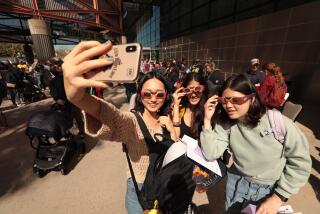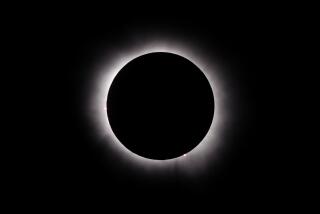Solar eclipse: How to watch it without blinding yourself
Solar eclipse excitement is building, but one astronomer is trying to warn the masses: Don’t look up into the sky with the naked eye during Sunday’s solar eclipse. To do so is to risk serious eye injury and even blindness, he said.
“Looking up into the [solar eclipse] without the proper protection is just dangerous,” said astronomer Stephen Edberg at NASA’s Jet Propulsion Laboratory. “You need proper eye protection.”
Beginning late Sunday afternoon, a large swath of the western United States will be positioned to see the solar eclipse and the so-called “ring of fire” created as the moon passes in front of the sun but doesn’t quite obscure it. The result will be a dramatic image as the sun’s rays shoot from behind. (This assumes that clouds don’t get in the way.)
In Los Angeles, the eclipse will begin about 5:25 and then hit its peak at 6:38 p.m. It will all be over for the West Coast by 7:43 p.m., Edberg said. The late time of day may mislead some folks into believing that it’s safe to look directly at the eclipse. “That’s not the case,” he said.
So, what is proper eye protection? It’s not sunglasses. “It’s not stacking sunglasses” one on top of the other either, said Edberg. Peering through a curtain, or through a car window that has been treated with a sun-filtering screen also won’t protect the eyes, he said.
Edberg said safe options include glasses specifically made for looking at the sun -- these cost 85 cents apiece. Contact a camera store or a hobby store to purchase one in time for Sunday’s celestial show.
He also suggested finding a hardware store that sells welding equipment. The No. 14 welders glass -- the darkest glass available -- would be perfect for holding up to the sun for safe viewing, he said
Another option is to find an astronomy club, museum or observatory that is holding an event to usher in the solar eclipse.
“The sun can be viewed directly only when using filters specifically designed for this purpose,” according to NASA. “Such filters usually have a thin layer of aluminum, chromium or silver deposited on their surfaces that attenuates ultraviolet, visible, and infrared energy.”
Also note that sun damage may not be immediately painful, so it’s not safe just because you can look up into the sun without feeling searing pain.
“Damage to the eyes comes predominantly from invisible infrared wavelengths,” NASA cautions. “The fact that the sun appears dark in a filter or that you feel no discomfort does not guarantee that your eyes are safe.”
rene.lynch@latimes.com
Join Rene Lynch on Google+, Facebook or Twitter. Email: rene.lynch@latimes.com
ALSO:
Man who had 30 kids with 11 women wants child-support break
Trayvon Martin and George Zimmerman: A portrait of The Retreat
Skechers lawsuit: How to get your piece of the $40-million payout
More to Read
Sign up for Essential California
The most important California stories and recommendations in your inbox every morning.
You may occasionally receive promotional content from the Los Angeles Times.











